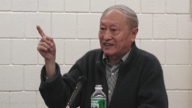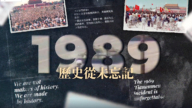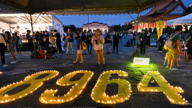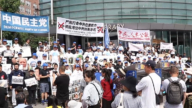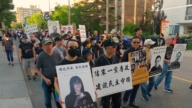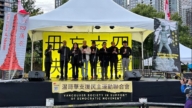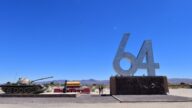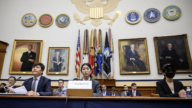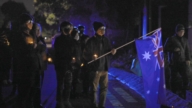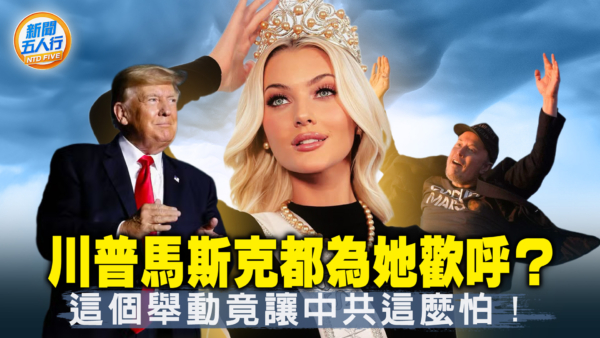【新唐人2012年9月18日讯】原《人民日报》总编辑、社长胡绩伟9月16号上午在北京逝世。胡绩伟一生追求新闻自由,曾大力推动中国新闻法的起草和制定,晚年又呼吁废除中国新闻预审制度。他在病重时,还托人带话给友人,呼吁十八大平反“六四”。
胡绩伟从1952年起在《人民日报》社工作,先后担任副总编辑、总编辑、社长等。文革中他受过批斗,76年复职,以后也多次遭到整肃。 1983年9月,胡绩伟受到清除资产阶级精神污染运动的牵连,辞去《人民日报社》社长职务,而转任七届人大教科文卫委员会副主任。期间他曾不遗余力的推动中国新闻法的起草和制定,但最终没能实现。
1989年“六四”事件后,胡绩伟被中共当局以支持动乱为由,撤销一切职务,留党查看两年,并延期三次。其后,他住所楼下一直有国保人员监视。
六四民运人士 郑存柱“大家都知道‘六四’发生之前,就是89年学生游行的时候,他当时作为人大里面的一个主要的领导人物吧,他就是主张召开人大会议,通过法制的渠道来解决这个问题。但是他的建议不但没有被采纳,我们都知道后来中共是采取军队镇压的方式来处理学生的游行。他最后也被…本来要开除出党,后来把他留党查看。”
北京前右派、老记者铁流:“他是因为‘六四’反对政府开枪镇压学生,最后他才没有受到重用。他一生追求新闻自由,因为一个国家,一个政府,没有言论自由,就会变得很专横,不讲法,不按照法律办事。 ”
香港《明报》17号引述前国务院发展研究中心研究员姚监复的话说,他9月11号去探望胡绩伟时,胡绩伟特意支开医生和家人,单独托他转告前《经济学周报》副总编辑高瑜,要高瑜写文章,呼吁十八大平反“六四”。
姚监复形容,胡绩伟的思维“不仅非常清楚,而且与时俱进”,他说,胡绩伟还向他谈到,他认为自己相信马克思主义是错误的,加入共产党是错误的。恩格斯、马克思对于社会的判断是错的,不应该走向无产阶级专政,而应该实现资产阶级民主主义社会。
郑存柱:“‘六四’这个问题不管是共产党主动平反也好,还是将来人民自己写历史的时候,给它一个正确的评价,我相信这个时间都不会太长。胡绩伟先生这样一个最后的临终的愿望,我相信他的在天之灵一定能够看到的。 ”
为了追求言论自由,胡绩伟一直希望在中国推出一部保护记者权益和新闻采访自由的新闻法。2010年,他和22位退休老干部和老知识份子,共同发布致全国人大常委会的公开信。呼吁“执行中国宪法第35条,废除新闻出版领域的预审制,兑现公民言论出版自由。”
胡绩伟最后出版的书,是2012年由姚监复所整理,研究胡耀邦和赵紫阳的《胡赵新政启示录》。书中,他公开提出对自己一生共产主义信念的疑问,并要求为“六四”冤案及胡耀邦、赵紫阳平反,这被海内外学术界称为“当代屈原的‘天问’”。
采访/朱智善 编辑/尚燕 后制/柏妮
Hu Jiwei Dies—6.4 Incident Redress and Reform Unfinished
The former People’s Daily editor-in-chief, President Hu Jiwei
died in Beijing on the morning of September 16.
Throughout his life, Hu Jiwei had been seeking press freedom
by vigorously promoting the drafting and
enactment of the Press Law, and in his later years,
calling to abolish the China News preliminary review system.
Even when he was seriously ill, he also asked someone
to tell his friend,
calling on redressing 6.4 Incident in the meeting of
the 18th National Congress of the CCP.
Hu Jiwei had been working for the Chinese Communist Party
(CCP)’s official newspaper, People’s Daily, since 1952,
having served as deputy editor, editor-in-chief and president.
During the Cultural Revolution (1966 – 1976),
Hu Jiwei had suffered political persecution;
after being reinstated in 1976 he was purged several times.
Sep. 1983—Hu resigned as People’s Daily’s president, during
the CCP’s ‘campaign of clearing bourgeois spiritual pollution’
which tried to curb Western-inspired liberal ideas in China.
He then served as deputy director of the 7th National People’s
Congress(NPC)’s Education, Science, Culture and Public Health Committee (ESCPHC).
Hu Jiwei had spared no effort in promoting the drafting and
enactment of the Press Law in China, but ultimately failed.
After the 1989 Tiananmen student protests or ’6.4 Incident’,
the CCP withdrew Hu Jiwei from all of his CCP posts for
supporting the unrest, leaving him out of the party for 2 years,
and later extending the term 3 times.
Subsequently, State Security personnel had been monitoring
him outside his home.
[Zheng Cunzhu, 6.4 Incident Democracy Activist]:
“We all know that before the 6.4 Incident, when students were in procession,
Hu was a major leader in the NPC, advocating
to convene the NPC, and to solve this problem by law.
But his proposal was not adopted and we all know that later,
the CCP dealt with the students by taking military repression.
Finally, Hu was also … going to be expelled from the party,
Later he was left out of the party."
[Tie liu, Former Right-Wing Reporter, Beijing]:
“Because Hu was against the CCP shooting and suppressing
the students in the 6.4 incident, in the end he was not wanted;
also throughout his life, he was seeking press freedom.
If a country, a government, has no freedom of speech, it will
be a lawless dictator and not act in accordance with the law."
Hong Kong’s Ming Pao Daily News quoted Yao Jianfu of the
former State Council Development Research Center(SCDRC) on September 17.
On September 11, when Yao had visited Hu Jiwei,
Hu had deliberately sent away doctors and family members,
and had personally asked Yao to send for Gao Yu,
the former deputy editor-in-chief of Economics Weekly.
Hu asked Gao Yu to write articles, calling on redressing the
6.4 Incident in the meeting of the 18th National Congress.
Yao Jianfu described Hu’s thinking as,
“not only very clear, but also keeping up with the times."
Hu had also told Yao that it is a mistake to believe in Marxism
and that it is wrong to join the Chinese Communist Party.
Engels’ and Marx’s social judgment is wrong; China should not
perform the dictatorship of the proletariat and should take a bourgeois-democratic society.
[Zheng Cunzhu, 6.4 Incident Democracy Activist]:
“Regardless of whether the CCP will redress the 6.4 incident,
I believe that it will not be too long before people will write
their own history to give it proper evaluation.
I believe that Mr. Hu must be able to see his last wish
become reality."
For seeking freedom of speech, Hu Jiwei had been hoping
to launch a press law in China to protect reporters’ rights and give freedom of news gathering.
In 2010, Hu, with 22 retired veteran cadres and the old
intelligentsia,
jointly released an open letter to the Standing Committee
of the National People’s Congress (SCNPC).
They called on the CCP to “carry out Chinese Constitution 35
to abolish the pre-trial system against the area of the Press and Publication, and to realize citizens’ freedom of speech".
Hu Jiwei’s last published book, ‘The Beginnings of Reform
Under Hu Yaobang and Zhao Ziyang’,
studies the revelations made by Hu Yaobang and Zhao Ziyang,
which was finished by Yao jianfu in 2012.
In the book, Hu Jiwei openly questions his lifelong belief in
communism and asks the CCP to redress the injustices of 6.4, and of Hu Yaobang and Zhao Ziyang.
The book has been likened to contemporary patriotic minister
and poet Qu Yuan’s work, “Heaven Asking” among academics both within China and internationally.


